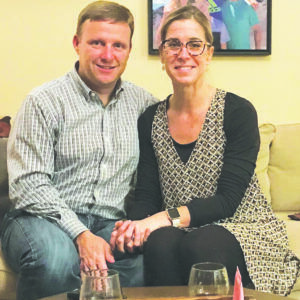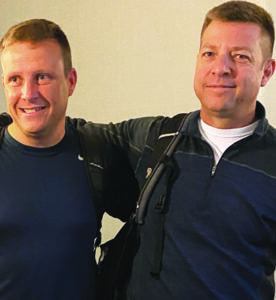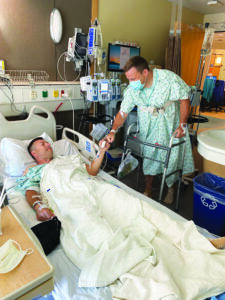
“If I ever had an opportunity to save a life, why wouldn’t I?”
That’s a question that Tim Schreiber asked himself and it didn’t take him long to answer it. Of course, he would. He’s just that kind of guy.
Many people know Tim. He’s worked at Farmers State Bank for many years and has been a leader in his Stevensville community. His wife Beth is a well-known elementary teacher at Stevensville and they’ve raised their two sons there, one now a sophomore at Montana Tech and the other a senior at Stevensville High School.
Tim’s brother-in-law, Rob Kennedy, who is married to Beth’s sister Sarah, had contracted a virus in his teens that affected his kidney function. As he grew older, his kidneys continued to deteriorate. Kennedy, a detective with the Missoula County Sheriff’s Department, went in for a routine procedure and the doctor found that his kidney function had dropped to 18%, indicating a rapid decline. He was put on a transplant list. All adult family members and co-workers were listed for possibility as a kidney donor, and after many tests, Tim proved to be a match, even though the likelihood of a non-blood related match is very slim. After another series of tests, Tim and Beth found out that it was likely that the transplant would work.
The two men each had separate teams, one for the donor, one for the recipient. Many tests were conducted in Missoula, then in Seattle for more tests: stress test, EKG, MRI, meetings with social worker, psychologist, team coordinator. But Tim still hadn’t been told he was definitively a match.

Finally, they got the call – Tim was a match. “I just cried,” said Beth.
She said that at every step of the way, there is an opportunity to back out, “even as they are wheeling him into surgery and up until the time he gets anesthetized.”
Everyone but Tim had some doubt, and the family was worried about Tim’s safety, she said, “but not Tim.”
Tim says that he and Rob are both “smart asses,” their sense of humor is a real bond between them.
“Everybody kept asking me, ‘why do you want to do this’?” says Tim. “Rob is a great guy, a great father, public servant, plus there’s always been a small part of me that wanted to be in law enforcement. I guess my kidney is that part.”
Tim also told people he was in it for financial reasons, a claim that undoubtedly brought a look of horror to their faces until he clarified. “I’ll never have to buy another gift or card for Rob. I gave the gift that keeps on giving.”
After determining that Tim was the right donor, a waiting game began. Rob’s kidney function had improved slightly, and it had to be below 20% function in order to do the surgery. About a year went by. And then Covid hit – Seattle wouldn’t take any elective surgeries, which a transplant is considered. And Covid does affect kidney function.
“We went on lockdown here,” recalls Beth. “School and work were all online until Tim was able to be vaccinated.”
Tim said up until that point he hadn’t really thought about the aftermath for Rob, who will have to take anti-rejection drugs for the rest of his life. “I was never worried about the aftermath for me,” said Tim. “If my kidney ever fails for any reason I go to the top of the transplant list. I thought about what if one of my family members needs a kidney. There’s more options now. It’s still difficult to find a match but the odds are much better than even 20 years ago.”
It was about two years from the time they learned that Rob needed a kidney to the time that Seattle finally opened back up. Rob’s numbers had dropped again and his health was declining. Tim had to get tested again to make sure he was healthy. July 12th was set as the surgery date. The two couples traveled together from Missoula to Seattle. Beth’s mom moved in with Rob and Sarah’s two sons. Tim and Beth’s older son Ben was away on an internship and their younger son Garrett stayed with Tim’s parents.
Tim checked into the hospital wearing his “Superman” socks.
The doctors told them afterwards that the surgery was “textbook.” Tim’s kidney was “gorgeous.”
“Tim had wonderful care,” said Beth. “I walked into his room after. He was super groggy. His first words were ‘How’s Rob: Did it work?’ Yes, I told him, ‘he’s okay.’ Then Tim passed out again.”

Tim was up and walking later that day. He wanted to know if Rob was awake. Rob was in a “pretty sterile environment,” said Beth, “but they let Tim walk in there. It was very emotional. That was the most powerful moment of the whole thing.”
“After I got back to my room, it was like a wave of emotion. It really hit me,” said Tim. He said he cried like a baby.
Tim was discharged the next day and they stayed at a hotel near the hospital. They remained in Seattle for about two weeks; Sarah and Rob were there for about one month more. The two men were able to take a few walks together.
After returning to Stevensville, Tim and Beth didn’t see Rob and Sarah until this past weekend. Beth said that getting the right balance of medications is challenging, and the recovery for the recipient takes a long time. “Now he’s looking really good,” said Beth. “He’s more vibrant than I’ve seen him in years.”
Rob went into surgery with 15% kidney function. Just hours after the surgery the function was already up to 54%.
“It felt like a miracle,” said Beth. “His entire adult life he hadn’t been over 30%.”
“I did get a lot of praise from the hospital staff,” said Tim “You have such a good heart.” Tim would shoot back with one of his one-liners: “Well, he’s not getting my heart.”
For Tim, the recovery process was not too bad. He said fatigue hung on for longer than he expected, and he was subject to headaches, but he said that if he remembered to drink lots of water and not overdue it on protein, he felt better. After four months, he’s feeling “back to normal.”
He said that he and Rob have both been affected psychologically by the experience. Tim’s noticed that he now blurts out anything that comes to mind, not something he previously did. He wonders if this is “a strange side effect?” And he says that Rob has become very emotional, crying a lot. But both these “side effects” are a small price to pay.
For potential donors, the couple has some words of advice.
“I went into this not knowing what it really entailed,” said Tim. “I didn’t know how much I didn’t know. There’s all kinds of assistance available.”
“There is really no financial risk,” said Beth. “None at all.”
Beth recalls that Rob recently said to their son Garrett, “I hope you know how heroic your father is.” That was so touching to her.
“There is this cherishing that takes place that is indescribable,” said Beth. “This was a moment where I could show the world what a humble and caring person my husband is.”
“I donated a kidney,” said Tim. “If you have an opportunity to save a life, why would you say no?”